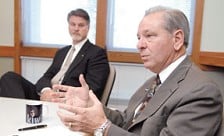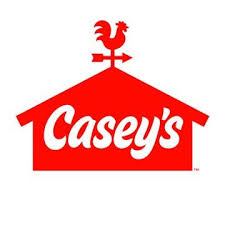Central Iowa Works begins to show results

Bill Gray was 54 years old when he went from being a well-paid worker in a skilled industrial job to another Iowa unemployment statistic.
After 30 years in the heavy-equipment industry as a painter, the last 13 working at Ziegler Inc.’s Caterpillar dealership in Altoona, he was laid off due to the recession in January 2009.
Not sure of what direction he wanted to take, he began shopping for training programs in various fields. During a seminar at Grand View University, he met Cassandra Halls, a career counselor who told him about training programs offered through Central Iowa Works.
After completing a Workforce Training Academy course at Des Moines Area Community College (DMACC), Gray landed a job at Iowa Methodist Medical Center’s sterile processing department, where he readies surgical equipment for use by the hospital’s emergency department.
“I always had an interest in the medical field, and I figured this was my chance to pursue that,” said Gray, who has now worked at Methodist for nearly a year.
Skill shortage
Central Iowa Works, a public-private partnership formed three years ago to replace the scandal-ridden Central Iowa Employment and Training Consortium (CIETC), is administered by DMACC. Other major partners are the Greater Des Moines Partnership, the Community Foundation of Greater Des Moines, Iowa Employment Solutions, the National Fund for Workforce Solutions, United Way of Central Iowa and the Annie E. Casey Foundation.
“Obviously, we started this at a time when the state of Iowa had a real workforce shortage,” said Rob Denson, DMACC’s president and member of the Central Iowa Works board. “Then, we were under the gun not having enough workers. That’s changed a little bit, obviously Now there are a lot more persons in the queue, but there are still skills shortages that we’re dealing with. That’s why we need to have business so much engaged in this.”
According to initial data tracked by United Way, Central Iowa Works has assisted in placing 576 individuals within its first seven quarters of operation. Of those people placed, 241 have been retained in their jobs for more than six months, said Jane Fogg, United Way’s director of financial stability.
“One of our goals for United Way is that more families are financially stable, and there’s no better way to get there than a good-paying job with steady benefits,” Fogg said. Those numbers may not fully capture all of Central Iowa Works’ activities, as the organization is still coordinating data reporting between multiple agencies, she said.
A major part of the initiative has been the development of workforce partnership groups in key industry areas for Central Iowa. Seven such workforce partnership boards are now guiding training efforts in the information technology, financial services, construction, advanced manufacturing, health care, energy and the service/retail sectors. Another two industry sector partnerships are planned for the areas of biosciences and education.
“It’s been hard work getting everybody involved in this,” Denson said. “When we became a (Central Iowa Works) service provider, we went from three agencies partnering with us in the one-stop (workforce center) to nearly 50 now. It’s about everyone working together as a system; we don’t care whether we (provide the services) or someone else does, just that people are being served.”
Michael Wilkinson, administrator of Iowa Workforce Development’s Unemployment Services Division, said development of “career pathways” within the key industries has been one of Central Iowa Works’ most valuable contributions. Created with input from businesses and labor organizations, the pathway charts outline the education and experience necessary to compete for those types of positions.
“I think the biggest shift is that business and labor are really driving how we behave in the workforce community,” said Wilkinson, who led Iowa Employment Solutions at DMACC prior to his current position. “They’re setting the priorities; they’re the ones who need the workers and who know what skills are needed.”
Job developers
Within each of the approximately 50 partner organizations that are under the Central Iowa Works umbrella, “job developers” have been assigned who are specifically responsible for job placement functions.
“We are meeting with them twice a month to specifically target the clients they are working with, and also working to develop the skills of those job developers,” said Sue Gibbons, who until recently was the career pathways coordinator at DMACC. She now serves on the board of the health-care sector partnership, which is called Central Iowa Careers in Health Care.
Health care, financial services and energy are three areas in which Central Iowa Works is currently focusing its efforts because those sectors have been identified as having the most immediate job-training needs, Gibbons said.
These partnerships are resulting in new programs that specifically address training needs, she said.
In the health-care sector, for instance, “our employers have identified that for many of them, the gaps are in those basic employee skills,” Gibbons said. “We realize that this isn’t anything new, but now we are really addressing that lack of skills – things like communication skills, presenting an acceptable appearance and demeanor in the workplace. This has been where the community colleges have been very supportive. We are taking those soft skills and are now starting to integrate those into the hard-skills curriculum.”
As one example of that, Iowa Health – Des Moines, a member of the health-care partnership, has worked with DMACC to develop a “basic skills in health care” curriculum.
“They can be called ‘soft’ skills, but they’re far from soft,” said Sue Allyn, Iowa Health’s vice president of human resources, who serves on the health-care partnership board. “They’re survival skills.”
Allyn said the program, which was initially developed to provide better skills to unit clerks who greet patients, has also been incorporated into the surgical technician curriculum at DMACC. The course has enabled Iowa Health – Des Moines to reduce turnover among its unit clerks from 24 percent to about 10 percent, she said.
The partnership has also provided more effective communication of employers’ needs, Allyn said. For instance, participating health-care organizations now have a spreadsheet of training providers at their fingertips.
Recently, “we had an employer that had an immediate need for a medical lab technician,” she said. “Because of the spreadsheet, the employer knew exactly who to call at DMACC. They had a candidate out the next day for an interview, and that person was hired that day.”
From a worker’s perspective, shifting into a new career during a recession isn’t painless, at least in Gray’s case. Though he enjoys the fast pace of his new job, “the biggest drawback is I’m in the same situation as a lot of people – I’m making less than half of what I did before,” he said.
With just a year under his belt in the new position, Gray said it’s unlikely that he’ll take advantage of any further retraining possibilities through Central Iowa Works in the near future.
Breaking barriers
In the financial services sector, employers are working with the community colleges to develop a basic financial services training curriculum that could be offered to underemployed individuals, said Halls, the training consultant who told Gray about Central Iowa Works. The curriculum would also be valuable to recent high school and college graduates who aren’t familiar with the financial services industry, she said.
“We have the key Central Iowa financial services employers at the table, and they are very aware that the employee shortage and skills shortage is going to come back around,” she said.
Another of that partnership’s focuses is working with people who have faced barriers to employment in financial services, Halls said.
“One of the most interesting discussions we’ve been having is about those people who have been formerly incarcerated,” she said. Among a group of about 1,000 job seekers that 15 Central Iowa nonprofit organizations have worked with, approximately half had criminal records, Halls noted.
“We’re really identifying that there may be some policy advocacy opportunities for these organizations as well that would open the doors to populations that have never been eligible to be in the industry,” she said.
Chuck Palmer, president of ISED Ventures, said his nonprofit organization has benefited from the network of relationships that Central Iowa Works has developed. ISED works with low-income residents to build their skills.
“As we put together networks of job developers, we see where there are limits to what we can do, but know better what other agencies do and work with them to enhance the services that can be provided,” he said. “We’re trying to take down the silos of agencies competing against each other, and having a more collective approach to providing those services … It makes our work more intentional, more efficient, and we can focus on what we do best.”
Denson said that overall he’s “very pleased” with Central Iowa Works’ progress so far.
“The thing that has been the slowest developing from my point of view is a common database system to track clients across and between agencies,” he said. United Way, which has developed a data tracking tool that it provides to all of its member agencies that partner with Central Iowa Works, has agreed to work with DMACC to provide that software to non-United Way agencies as well, Denson said.
“As with most things, it’s more complicated than I thought it was initially,” he said.









